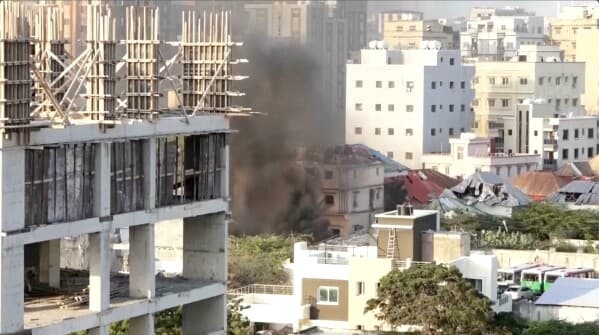We're loading the full news article for you. This includes the article content, images, author information, and related articles.
Al-Shabaab militants, disguised as soldiers, launched a sophisticated attack on a high-security prison in Mogadishu, Somalia, raising concerns about the group's evolving tactics and the vulnerability of critical infrastructure.

Al-Shabaab militants, adopting military disguises, stormed the Godka Jilacow prison in Mogadishu, Somalia, on Saturday, October 4, 2025, in an attack that lasted six hours. The incident, which involved an explosion and heavy gunfire, occurred near the presidential palace and highlighted significant security vulnerabilities in the Somali capital.
The militants reportedly used a vehicle painted in the colours of Somali security forces, enabling them to bypass initial checkpoints. This tactic allowed them to reach the high-security detention centre, which also serves as the headquarters for a regional intelligence unit. Witnesses in the central Mogadishu district of Bondhere reported hearing explosions and gunfire, with smoke billowing from the prison.
The attack came just hours after the federal government lifted several long-standing roadblocks in Mogadishu. These barriers had been in place for years to safeguard critical government sites, but their removal, intended to ease traffic and commerce, inadvertently created an opening for the militants.
Al-Shabaab, an al-Qaeda-linked militant group, has been engaged in a protracted insurgency against the Federal Government of Somalia for over 17 years. The group frequently carries out bombings and other attacks in Mogadishu and other regions of Somalia, aiming to destabilise the government and establish a strict Islamic rule.
While government forces, supported by local militias and African Union troops, have pushed Al-Shabaab fighters out of several areas in central and southern Somalia, the group remains influential in many rural areas and continues to launch guerrilla attacks. The United States Africa Command (AFRICOM) describes Al-Shabaab as the “largest, wealthiest, and most lethal” branch of al-Qaeda globally.
Somalia's Ministry of Internal Security confirmed that the attackers used a disguised vehicle to bypass checkpoints, exposing weaknesses in inspection procedures. This incident has prompted an immediate review of convoy verification protocols, with new directives expected to mandate inspections for all military-marked vehicles, reversing previous exemptions.
Analysts suggest that this development could influence near-term public debate and policy execution, with stakeholders urging clarity on timelines, costs, and safeguards for urban security. The attack fits a pattern of Al-Shabaab's shifting urban tactics, moving from mass-casualty bombings towards strikes that test government credibility.
The Somali government reported that its forces successfully ended the siege, killing all seven attackers, and stated that no prisoners escaped. However, Al-Shabaab claimed responsibility for the attack, asserting that it had released prisoners. A private ambulance owner, Abdulkadir Adam, reported that his vehicles transported nearly 25 patients from the scene to various hospitals. A private hospital director, Abdulkadir Yousuf Abdullahi, confirmed receiving an unspecified number of patients for emergency care.
Residents expressed renewed anxiety following a period of relative calm. Hibo Mohamed, a local resident, told The Associated Press, “We are truly scared. The city had been calm for months, but now everyone feels anxious once more.”
The successful infiltration of a high-security facility using disguises underscores the persistent threat posed by Al-Shabaab and its adaptability. This incident could lead to a re-evaluation of security protocols across critical government installations in Mogadishu and potentially other urban centres in Somalia. The group's ability to exploit changes in security posture, such as the lifting of roadblocks, poses a significant challenge for maintaining both security and normalcy for citizens. Continued attacks could undermine public confidence in the government's ability to ensure safety and stability.
The Somali government's implementation of new security directives for military-marked vehicles will be crucial in preventing similar future attacks. The ongoing efforts by government forces, local militias, and African Union troops to counter Al-Shabaab's insurgency will also be a key area to monitor. The international community will be watching for any shifts in Al-Shabaab's operational tactics and their impact on regional stability.
In other news, Kenyan health advocate Jerop Limo was recently recognised as a 2025 Goalkeepers Champion by the Bill & Melinda Gates Foundation. Limo, 27, was honoured in New York for her work in placing young people at the centre of the HIV response. She was among ten individuals globally celebrated for their contributions to child health and vaccine equity. The overall 2025 Global Goalkeeper Award was presented to Pedro Sánchez, President of the Government of Spain.
Keep the conversation in one place—threads here stay linked to the story and in the forums.
Sign in to start a discussion
Start a conversation about this story and keep it linked here.
Other hot threads
E-sports and Gaming Community in Kenya
Active 9 months ago
The Role of Technology in Modern Agriculture (AgriTech)
Active 9 months ago
Popular Recreational Activities Across Counties
Active 9 months ago
Investing in Youth Sports Development Programs
Active 9 months ago